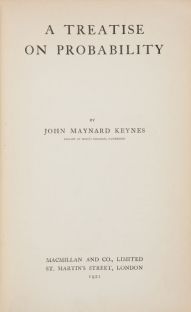From Lars Syll The incorporation of new information makes sense only if the future is to be similar to the past. Any kind of empirical test, whatever form it adopts, will not make sense, however, if the world is uncertain because in such a world induction does not work. Past experience is not a useful guide to guess the future in these conditions (it only serves when the future, somehow, is already implicit in the present) … I believe the only way to use past experience is to assume that the world is repetitive. In a non-repetitive world in which relevant novelties unexpectedly arise testing is irrelevant … Conceiving economic processes like sequences of events in which uncertainty reigns, where consequently there are “no laws”, nor “invariants” or “mechanisms” to discover, the kind of
Topics:
Lars Pålsson Syll considers the following as important: Uncategorized
This could be interesting, too:
tom writes The Ukraine war and Europe’s deepening march of folly
Stavros Mavroudeas writes CfP of Marxist Macroeconomic Modelling workgroup – 18th WAPE Forum, Istanbul August 6-8, 2025
Lars Pålsson Syll writes The pretence-of-knowledge syndrome
Dean Baker writes Crypto and Donald Trump’s strategic baseball card reserve
from Lars Syll
The incorporation of new information makes sense only if the future is to be similar to the past. Any kind of empirical test, whatever form it adopts, will not make sense, however, if the world is uncertain because in such a world induction does not work. Past experience is not a useful guide to guess the future in these conditions (it only serves when the future, somehow, is already implicit in the present) … I believe the only way to use past experience is to assume that the world is repetitive. In a non-repetitive world in which relevant novelties unexpectedly arise testing is irrelevant …
Conceiving economic processes like sequences of events in which uncertainty reigns, where consequently there are “no laws”, nor “invariants” or “mechanisms” to discover, the kind of learning that experiments or last experience provide is of no use for the future, because it eliminates innovation and creativity and does not take into account the arboreal character and the open-ended nature of the economic process … However, as said before, we can gather precise information, restricted in space and time (data). But, what is the purpose of obtaining this sort of information if uncertainty about future events prevails? … The problem is that taking uncertainty seriously puts in question the relevance the data obtained by means of testing or experimentation has for future situations.
Marqués’ book is a serious challenge to much of mainstream economic thinking and its methodological and philosophical underpinnings. A must-read for anyone interested in the foundations of economic theory, showing how far-reaching the effects of taking Keynes’ concept of genuine uncertainty really are.
 Science according to Keynes should help us penetrate to “the true process of causation lying behind current events” and disclose “the causal forces behind the apparent facts.” Models can never be more than a starting point in that endeavour. He further argued that it was inadmissible to project history on the future. Consequently, we cannot presuppose that what has worked before, will continue to do so in the future. That statistical models can get hold of correlations between different ‘variables’ is not enough. If they cannot help us get at the causal structure that generated the data, they are not really ‘identified.’
Science according to Keynes should help us penetrate to “the true process of causation lying behind current events” and disclose “the causal forces behind the apparent facts.” Models can never be more than a starting point in that endeavour. He further argued that it was inadmissible to project history on the future. Consequently, we cannot presuppose that what has worked before, will continue to do so in the future. That statistical models can get hold of correlations between different ‘variables’ is not enough. If they cannot help us get at the causal structure that generated the data, they are not really ‘identified.’
How strange then that economics textbooks do not even touch upon these aspects of scientific methodology that seems to be so fundamental and important for anyone trying to understand how we learn and orient ourselves in an uncertain world! An educated guess on why this is a fact would be that Keynes’ concepts are not possible to squeeze into a single calculable numerical ‘probability.’ In the quest for quantities one puts a blind eye to qualities and looks the other way and hopempeople will forget about Keynes’ fundamental insight
Robert Lucas once wrote — in Studies in Business-Cycle Theory — that “in cases of uncertainty, economic reasoning will be of no value.” Now, if that was true, it would put us in a tough dilemma. If we have to consider — as Lucas — uncertainty incompatible with economics being a science, and we actually know for sure that there are several and deeply important situations in real-world contexts where we — both epistemologically and ontologically — face genuine uncertainty, well, then we actually would have to choose between reality and science.
That can’t be right. We all know we do not know very much about the future. We all know the future harbours lots of unknown unknowns. Those are ontological facts we just have to accept — and still go for both reality and science, in developing a realist and relevant economic science.
